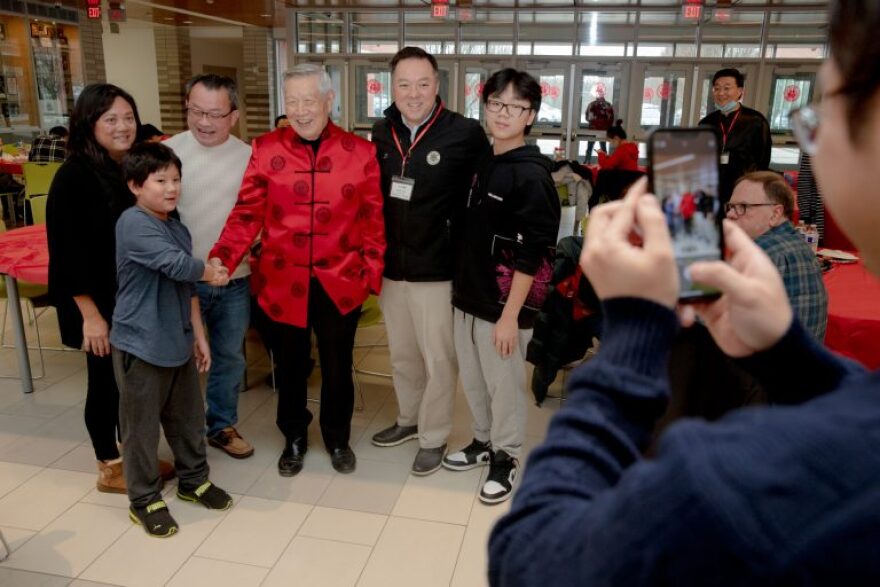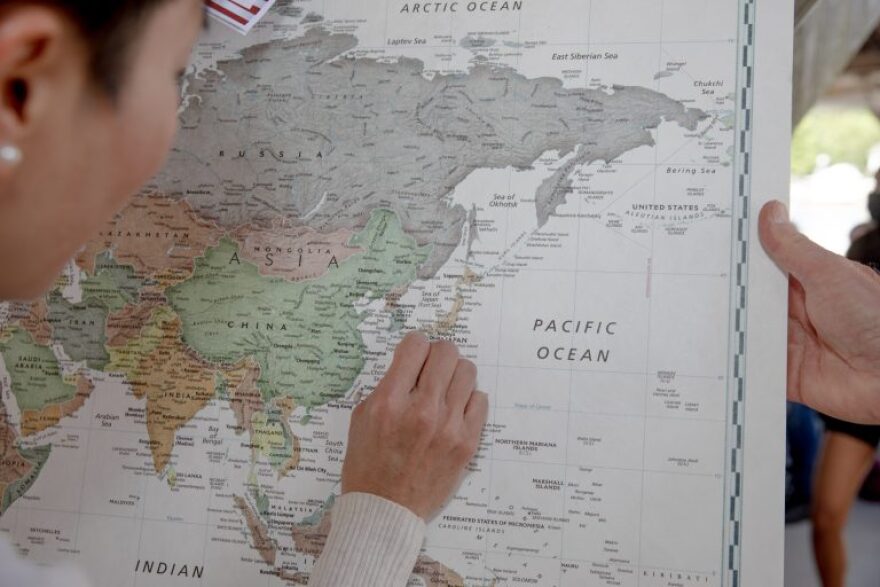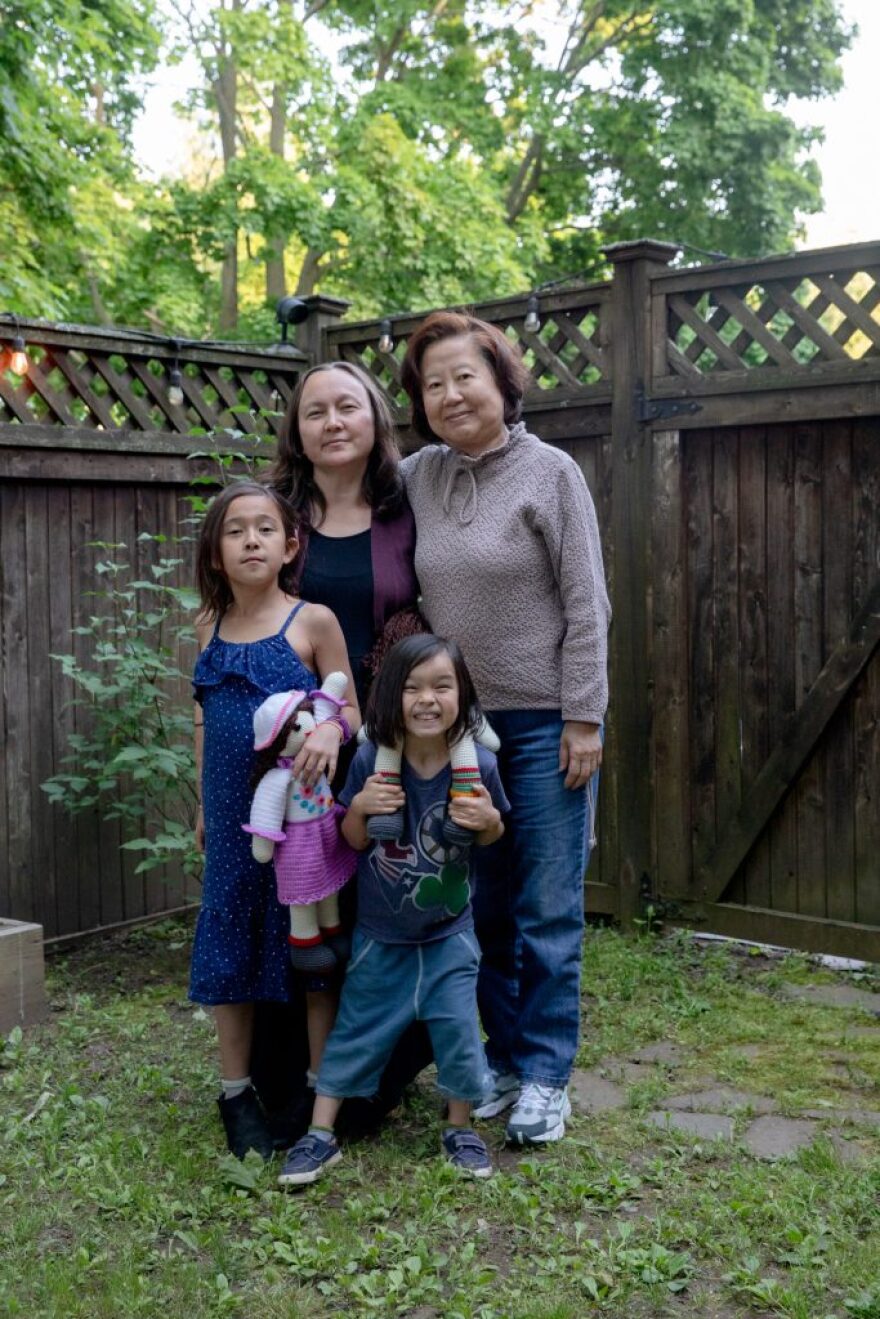A Diaspora in Focus
As the state develops an Asian American history curriculum for public schools, the CT Mirror profiled and photographed residents as a way to learn more about Asia’s 21 ethnicities. In this story, we highlight residents from East Asia.
Click the red bubbles to view profile previews.

William Tong still gets asked about the chicken wings at his parents’ Chinese restaurant, even though it closed more than three decades ago.
“The Sampan had wonderful, delicious, old school Chinese restaurant chicken wings that are very different than the chicken wings you can buy today,” recalled Tong, who said he still cooks them every so often for fundraisers and community gatherings. “People from that time and era remember them fondly.”
Located in Wethersfield, the Sampan served as the foundation of Tong’s childhood. When they were young, he and his sisters spent their days playing in the parking lot outside, pushing each other around in shopping carts from the nearby A&P. As he grew older, Tong worked at the Sampan, doing everything from serving to cooking.
“If you put me back in a Chinese restaurant, and you gave me just an hour or so to get reacclimated, I can probably cook most everything on a standard Chinese restaurant menu,” said Tong.

Tong has fond memories of the restaurant now, but as a teenager, he resented it. Often, he’d peer through the diamond-shaped window in the door separating the kitchen from the dining room, keenly aware that he did not live in the same world as the people on the other side of it. He said those feelings of alienation and otherness stick with him to this day.
“I think that's what motivates me and compelled me to get into public service. So that people would recognize and see people like my family, acknowledge us, hear our voices — literally fight for a seat at the table,” he said.
Today, as Connecticut’s attorney general, Tong has found a seat at that table. But he’s also learned that racism can follow you anywhere, even into the halls of power.
Tong has fond memories of the restaurant now, but as a teenager, he resented it. Often, he’d peer through the diamond-shaped window in the door separating the kitchen from the dining room, keenly aware that he did not live in the same world as the people on the other side of it. He said those feelings of alienation and otherness stick with him to this day.
“I think that's what motivates me and compelled me to get into public service. So that people would recognize and see people like my family, acknowledge us, hear our voices — literally fight for a seat at the table,” he said.
Today, as Connecticut’s attorney general, Tong has found a seat at that table. But he’s also learned that racism can follow you anywhere, even into the halls of power.

On the day Sachiyo Langlois turned 46, the realization that she had lived more than half of her life in the United States, not in her home country of Japan, hit her hard. She began to feel it was time to become an American citizen, instead of remaining a permanent resident, also known as a green card holder.

“I'm a business owner and pay tax, but I didn't get to vote,” Langlois said. “That was starting to bother me. I wanted to participate in democracy, which is falling.”
The balance and discipline she learned practicing rhythmic gymnastics from childhood into her early 20s in Japan has allowed Langlois to run her own barefoot massage shop in Glastonbury for four years — a massage originating in Southeast Asia that she combined with Japanese and American massage elements.
Becoming an American citizen in June 2022 also meant giving up her Japanese citizenship, but she was certain about her choice.
Langlois left her hometown, Kumamoto, when she was 15 for a boarding school elsewhere in Japan, and when she returned to the country as an adult after living in Connecticut, it felt different and crowded.
She felt more at home when she returned to Connecticut. “I not only love the country, but I love American people,” she said. “You can be who you are, and it's OK to be different. That's something that I think Japan did not have. We had to be in a certain frame or group.”
-Yehyun Kim

Dari Jigjidsuren’s Ph.D. program in social work started just two weeks after her third child was born. She would study while pushing the baby chair with her foot and go to school after dropping him off at a day care center. When her kids got sick, she would skip class to stay home with them and catch up later on her own.
A teenage Jigjidsuren always imagined that she would follow in her father’s footsteps and go to college in a Soviet satellite state, such as Hungary or East Germany. Mongolia was a socialist country with close ties to the Soviet Union from the early 1920s to 1992, and the government exchange programs with other socialist countries allowed students to attend universities abroad for free.

“This is really, really important for Mongolia, that had not very well-developed educational system at that time,” Jigjidsuren said. Top-performing high school graduates would go to other countries for post-secondary education — like Cuba to study medicine or Hungary to study special education — but also for professional training, like sausage-making in Germany or shoe-making in the Czech Republic. Jigjidsuren’s father went to the Uzbek Soviet Socialist Republic for a degree in electrical engineering.
However, by the time she graduated from high school in 1991, the socialist governments, and the exchange systems Mongolia had established with them, were falling apart. Now, if Jigjidsuren wanted to go to college abroad, she’d have to pay her own way. “We had this union, you see, and then it collapsed,” Jigjidsuren said. “Nobody owes anybody anything anymore. All the contracts are gone.”
In her childhood in the 1980s, Russian was the second language that Mongolian students learned in secondary education. “If you knew Russian, you had a window to the world,” she said. After going to a Soviet school in Darkhan along with children of specialists from socialist countries residing in Mongolia, Jigjidsuren dreamed of studying abroad. “I guess I wanted to see how far I can go,” she said.
Jigjidsuren stayed in Mongolia, choosing to study English at the Institute of Foreign Languages, which is now the University of the Humanities, and then taught there for three years after graduating. Life was stable, but her yearning to study abroad remained.
“This has really been my dream,” she said. “I really wanted to see the world.”
After earning dual master’s degrees and a Ph.D. at the University of North Carolina at Chapel Hill and working as a visiting professor at Mississippi State University, Jigjidsuren started a new position in May at Wesleyan University as an assistant director at the Office of International Student Affairs.
“I was myself an international student for so many years in the United States. It would be nice for me to help other students as I know more about the problems they must face and everything,” Jigjidsuren said.
-Yehyun Kim

On the day of Jennifer Heikkila Díaz’s youngest child’s sixth birthday in May 2022, the family received a visit from Heikkila Díaz’s aunt and uncle, Choyeon Ock and Young Won Lee, who live in Orange.
This was the aunt who made seaweed soup, which many Koreans eat to celebrate their birthday, when Heikkila Díaz’s children — Gabriela, 7, and Magdalena, 10 — were born. This time, the aunt brought handmade crochet dolls for both children. As soon as they had some bibimbap, bulgogi, tonkatsu and sushi rolls in their New Haven backyard, Gabriela and Magdalena sat on the stairs with their books so they could read to their new dolls. One of the books Magdalena brought was "Eyes That Kiss in the Corners,” which she had recently read. The New York Times bestseller picture book features a Taiwanese girl who notices that her eyes look different from her friends’ big, round eyes with long lashes and, after some struggle, learns to love herself.
“It doesn’t matter what you look like. You should be proud of who you are,” Magdalena, 9, said of the lesson she took away from the book.

Their mother stood nearby, smiling. “That's a book that I wish I had had when I was a kid,” said Heikkila Díaz, who uses they/them pronouns. Their children reading these books was not a coincidence; Heikkila Díaz carefully selects bedtime books to ensure the children grow up seeing people who look similar to and different from them to teach them the world is multifaceted.
This message is also reflected in the children’s culturally significant names; their first names, Magdalena and Gabriela, reflect Heikkila Díaz's husband's Colombian background, while their middle names, Yoon-jae and Mi-ja, represent their Korean background. “So yes, racial identity is an important part of what we talk about and how we live as a family, starting from when they were born and what names we gave them,” Heikkila Díaz said.
This is in stark contrast to how both Heikkila Díaz and their husband, Michael Díaz, were named. Jennifer’s mom, who immigrated in the early 1970s from Korea with $20 in her pocket, selected one of the most popular names at the time, hoping that the American-sounding name would help them more easily assimilate into the mainstream culture. Michael’s Puerto Rican father and Colombian mother also gave him a “white” name, having experienced a lot of racism. They also decided not to teach him Spanish, fearing their son would not speak fluent English if they did — a decision many other immigrant parents have made.
“She wanted us to be culturally connected at home, but she did still struggle with this idea of the need to assimilate to be successful,” Heikkila Díaz said of their mom. “Be Korean at home, but when you leave home, don't necessarily emphasize that … I think a lot of people in her generation that I've gotten to know who are parents struggled with that.”
Heikkila Díaz welcomed the news that K-12 public schools in Connecticut will teach AAPI studies. But having been a teacher themselves for 12 years and in the education field their whole adult life, Heikkila Díaz knew that passing the bill was only the beginning of the journey.
“Working on the curriculum in advance with involvement of teachers years ahead is the key to fulfill the ultimate goal of passing the law,” Heikkila Díaz said. “If there isn't a really clear plan for how it's going to roll out, then it's really, really hard on the teachers because you have to make this happen somehow magically.”
As an activist-in-residence at the Asian and Asian American Studies Institute at University of Connecticut, Heikkila Díaz has worked with about 40 public school teachers across Connecticut in the past two years to develop resources for AAPI studies in their classes.
Heikkila Díaz hopes this group of teachers in the program will provide an example of how the AAPI curriculum could be developed and how teachers can be supported by providing them with both curriculum resources and ongoing training.
“If you don't do that piece, and you just give people resources, then they're not getting the support that they need to really make those resources match and affirm the children in their classroom,” they said.
-Yehyun Kim

When Catherine Shen moved back to the U.S. after going to elementary and middle school in Taiwan for six years, her goal was to look and sound like everybody else. She stayed silent and hoped no one would notice she was from another country. Although she was surrounded by Taiwanese culture in her childhood and was emotionally drawn to it, she put those feelings aside as a teenager and focused on fitting in.
“I think teenage Cat was worried that people would think, ‘Oh, she's Asian. So obviously, she's gonna love whatever the thing is,’” Shen said.

More than a decade later, you can find Shen carrying a water bottle around with stickers of her favorite Chinese actor and singers. She no longer feels like she has to hide her heritage. The change came as she began to reflect on her identity as an Asian American with the rise of attacks against Asian American and Pacific Islanders during the pandemic.
“Jokingly, Asians don't think we're real Asians, and Americans don't think we're real Americans. So, who are we?”
She doesn’t have an answer to the question yet, but in the meantime, she has realized that it is OK to be herself and not feel the need to explain things. She started relearning Mandarin and relishing Chinese dramas and literature that she had previously avoided.
“Ten years ago, you would never catch me with the things that you're catching me having today,” Shen said.
-Yehyun Kim


